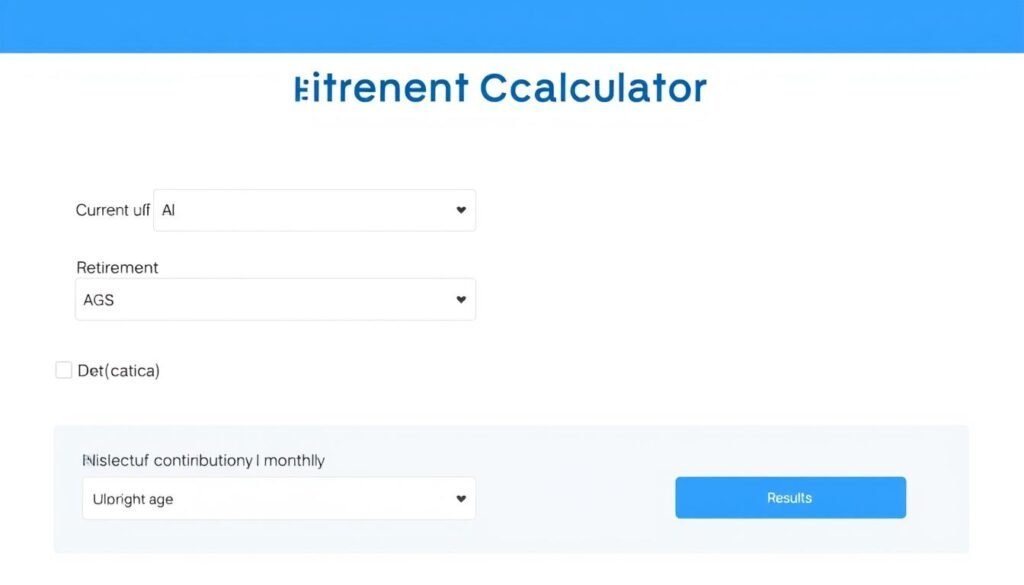Use our Retirement Calculator to estimate savings, investments, and income for retirement. Plan effectively to achieve your financial goals and secure your future.
Planning for retirement can feel overwhelming, but having the right tools makes all the difference. Our retirement calculator helps you determine exactly how much you need to save based on your unique situation. Whether you’re just starting your career or approaching retirement age, understanding your financial needs now can help secure your future.
Calculate Your Retirement Needs
Use our simple retirement calculator to get a personalized estimate of how much you’ll need to save for a comfortable retirement. Input your details below to see where you stand.

Our retirement calculator provides personalized projections based on your financial inputs
How Our Retirement Calculator Works
Our retirement calculator uses sophisticated financial models to estimate how much you’ll need for a comfortable retirement. By analyzing your current savings, income, and retirement goals, it provides a clear picture of your financial future.
Key Calculator Inputs
- Current age and planned retirement age
- Current retirement savings balance
- Monthly contributions to retirement accounts
- Expected annual income needed in retirement
- Anticipated investment return rates
- Estimated inflation rate
- Life expectancy projections
What You’ll Learn
- Total amount needed for retirement
- Current retirement savings gap
- Monthly savings required to reach your goal
- Impact of delaying retirement by a few years
- Effect of increasing your savings rate
- Projected retirement income breakdown
Key Factors Affecting Your Retirement Needs
Several critical factors influence how much you’ll need to save for retirement. Understanding these elements will help you make more informed decisions about your retirement planning strategy.
Inflation Impact
Inflation erodes purchasing power over time. At a 3% annual inflation rate, $100 today will be worth only about $40 in 30 years. Our calculator accounts for inflation to ensure your savings maintain their value throughout retirement.
Life Expectancy
Americans are living longer than ever. Planning to age 95 rather than 85 can significantly increase your required savings. Our calculator helps you prepare for a long, financially secure retirement.
Investment Returns
Your investment strategy affects your retirement timeline. Conservative portfolios may grow more slowly but with less risk, while aggressive investments offer higher potential returns with greater volatility.
Not Sure About These Factors?
Our retirement specialists can help you understand how these factors apply to your specific situation.
Understanding Retirement Account Options
Different retirement accounts offer various tax advantages and contribution limits. Choosing the right mix can significantly impact your retirement savings growth.
| Account Type | Tax Advantages | 2024 Contribution Limit | Best For |
| Traditional 401(k) | Pre-tax contributions; tax-deferred growth | $23,000 ($30,500 if age 50+) | Employees expecting lower tax bracket in retirement |
| Roth 401(k) | After-tax contributions; tax-free withdrawals | $23,000 ($30,500 if age 50+) | Employees expecting higher tax bracket in retirement |
| Traditional IRA | Potentially tax-deductible contributions; tax-deferred growth | $7,000 ($8,000 if age 50+) | Self-employed or supplemental retirement savings |
| Roth IRA | After-tax contributions; tax-free withdrawals | $7,000 ($8,000 if age 50+) | Long-term savers with income below limits |
Pro Tip: Many financial advisors recommend the “match beats Roth beats traditional” approach: First contribute enough to get your full employer match, then max out Roth options, then consider traditional accounts.
Common Retirement Calculator Mistakes to Avoid
Even with the best retirement calculators, certain mistakes can lead to inaccurate projections. Here’s how to avoid the most common pitfalls:
Best Practices
- Use realistic investment return rates (5-7% is often reasonable)
- Account for inflation (typically 2-3% annually)
- Plan for a long life expectancy (age 90-95)
- Include all income sources (Social Security, pensions, etc.)
- Regularly update your calculations as circumstances change
Common Mistakes
- Underestimating healthcare costs in retirement
- Assuming unrealistically high investment returns
- Forgetting to account for inflation
- Planning for too short a retirement period
- Ignoring the impact of taxes on retirement withdrawals

Working with a financial advisor can help you avoid common retirement planning mistakes
Effective Retirement Savings Strategies
Once you understand how much you need to save, implementing effective strategies can help you reach your retirement goals faster.
The Power of Compound Interest
Starting early dramatically increases your retirement savings through compound interest. Even small contributions can grow significantly over time.
Example: $5,000 invested annually starting at age 25 with a 6% return grows to approximately $820,000 by age 65. Waiting until age 35 reduces the total to about $419,000 – less than half!
Catch-Up Strategies If You’re Behind
If you’ve fallen behind on retirement savings, these strategies can help you catch up:
Immediate Actions
- Maximize employer matching in retirement plans
- Take advantage of catch-up contributions (additional $7,500 in 401(k) and $1,000 in IRA for those 50+)
- Reduce current expenses to increase savings rate
- Consider delaying retirement by 2-5 years
Long-Term Approaches
- Develop additional income streams
- Consider downsizing your home to free up equity
- Reevaluate your asset allocation for potentially higher returns
- Plan for part-time work in early retirement years
Need a Personalized Catch-Up Plan?
Our retirement specialists can help you develop a customized strategy to accelerate your retirement savings.
Future Trends in Retirement Planning Technology
Retirement planning tools continue to evolve with technology. Understanding these trends can help you take advantage of the latest innovations.
AI-Powered Projections
Advanced algorithms now analyze thousands of potential retirement scenarios to provide more accurate projections. These tools can simulate market volatility and adjust recommendations based on changing economic conditions.
Integrated Financial Planning
Modern retirement calculators increasingly connect with your actual financial accounts to provide real-time analysis based on your current investments, spending patterns, and savings behavior.
Personalized Risk Assessment
New tools help identify your unique risk tolerance and adjust investment recommendations accordingly, balancing growth potential with your comfort level for market fluctuations.
Important: While technology provides powerful planning tools, retirement calculators are only as good as their inputs. Regular reviews with a financial professional can help ensure your retirement plan stays on track as your life circumstances and financial markets change.
Frequently Asked Questions About Retirement Calculators
How accurate are retirement calculators?
Retirement calculators provide estimates based on the information you input and certain assumptions about the future. Their accuracy depends on the quality of your inputs and how closely future conditions match the calculator’s assumptions. For best results, use conservative estimates and update your calculations regularly as your circumstances change.
What percentage of my current income should I plan to replace in retirement?
Most financial advisors recommend planning to replace 70-80% of your pre-retirement income. However, this can vary based on your expected retirement lifestyle. If you plan to travel extensively or pursue expensive hobbies, you might need closer to 100%. If you expect a simpler lifestyle with reduced expenses, you might manage with 60-70%.
How often should I recalculate my retirement needs?
It’s wise to revisit your retirement calculations annually and after any major life changes such as marriage, divorce, career change, or inheritance. As you get closer to retirement age (within 5-10 years), consider more frequent reviews to fine-tune your strategy.
Should I include my home equity in retirement calculations?
Home equity can be a significant retirement asset, but whether to include it depends on your plans. If you intend to downsize or use a reverse mortgage, you can include the expected proceeds. However, if you plan to stay in your home indefinitely, it’s generally better to exclude home equity from your liquid retirement assets.
Take Control of Your Retirement Future Today
Understanding how much you need to save for retirement is the first step toward financial security in your later years. Our retirement calculator provides a personalized roadmap based on your unique situation and goals.
Remember that retirement planning is not a one-time exercise but an ongoing process. As your life circumstances change, revisit your calculations and adjust your strategy accordingly.
Ready to Secure Your Retirement?
Use our comprehensive retirement calculator to get started, then speak with one of our retirement specialists for personalized guidance.
Incorporating Social Security Into Your Retirement Plan
Social Security benefits are an important component of most retirement plans, but understanding how and when to claim them can be complex.
When to Claim Benefits
You can claim Social Security as early as age 62, but benefits are reduced by up to 30% compared to waiting until full retirement age (66-67 for most people today). Delaying until age 70 increases your benefit by 8% per year beyond full retirement age.
“The decision of when to claim Social Security is one of the most important financial choices you’ll make. For many retirees, waiting longer can provide thousands of dollars in additional lifetime benefits.”
Financial Planning Association
Social Security Calculation Factors
Our retirement calculator incorporates estimated Social Security benefits based on your income history, but for the most accurate projection, create an account at SSA.gov to view your personalized estimate.